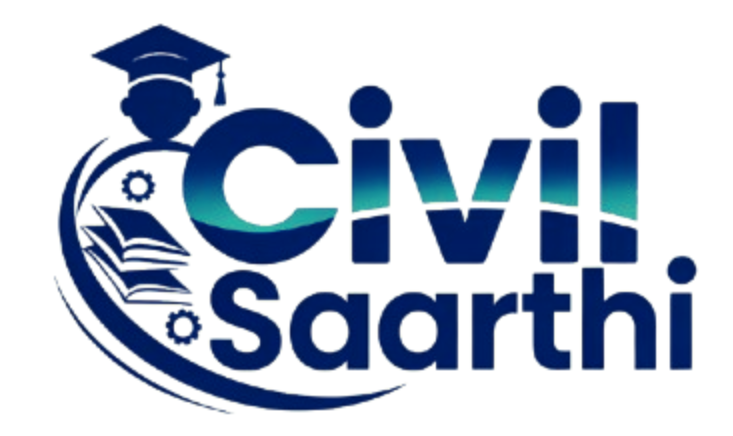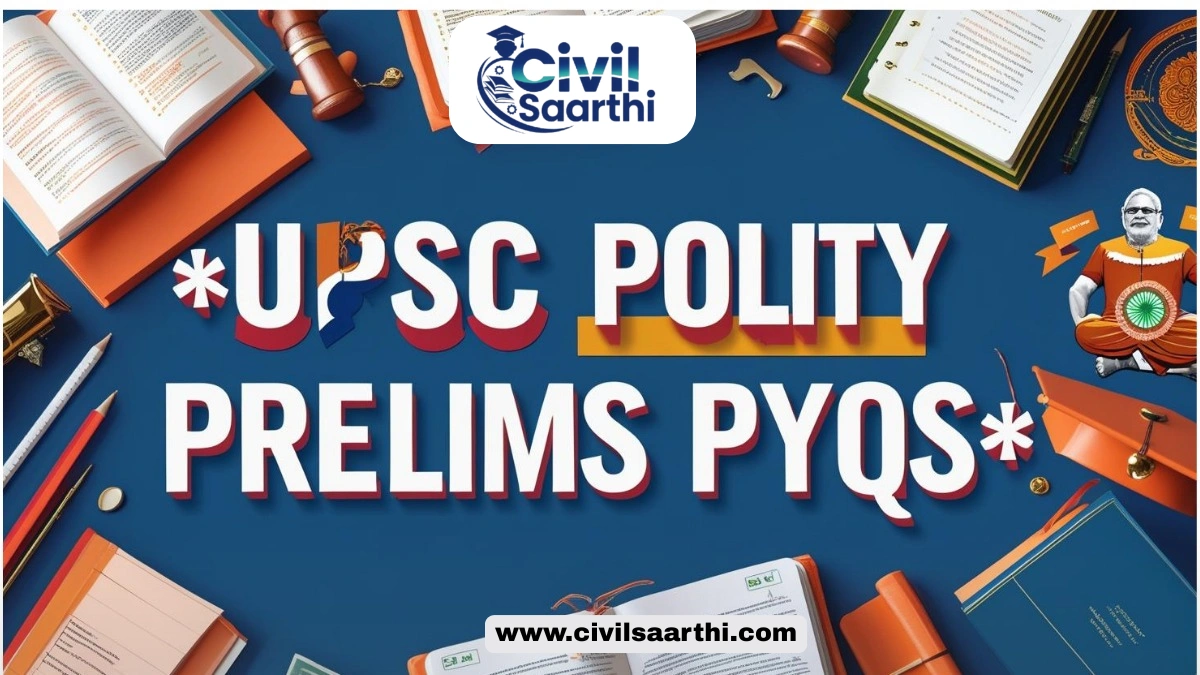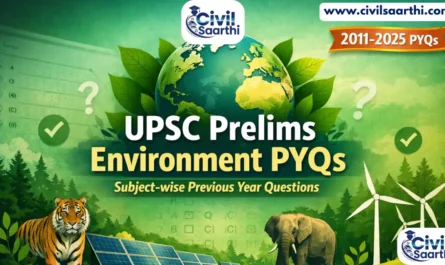Prepare smarter with a curated set of UPSC Prelims Polity PYQs (1995–2025) focused exclusively on Fundamental Rights. This collection includes detailed questions on Articles 12 to 35, covering topics like right to equality, freedom, constitutional remedies, and landmark Supreme Court judgments. Each question is organized topic-wise to help aspirants understand trends, recurring themes, and conceptual clarity. Ideal for last-minute revision and precision-based practice. Boost your IAS preparation with targeted, high-frequency questions from this critical part of the Constitution.
UPSC Prelims Polity Topic-wise PYQs on Fundamental Rights (2025 – 1995)
Q1. Under which of the following Articles of the Constitution of India, has the Supreme Court of India placed the Right to Privacy? [2024]
a) Article 15 b) Article 16
c) Article 19 d) Article 21
Ans d
Q2. Consider the following statements: [2023]
Statement-I The Supreme Court of India has held in some judgments that the reservation policies made under Article 16(4) of the Constitution of India would be limited by Article 335 for maintenance of efficiency of administration.
Statement-II Article 335 of the Constitution of India defines the term ‘efficiency of administration’.
Which of the following is correct in respect of the above statements ?
a) Both Statement-I and Statement-II are correct and Statement-II is the correct explanation for Statement-I
b) Both Statement-I and Statement-II are correct and Statement-II is not the correct explanation for Statement-I
c) Statement-I is correct but Statement- II is incorrect.
d) Statement-I is incorrect but Statement- II is correct.
Ans c
Q3. With reference to the writs issued by the Courts in India, consider the following statements: (2022)
- Mandamus will not lie against a private organisation unless it is entrusted with a public duty.
- Mandamus will not lie against a Company even though it may be a Government Company.
- Any public minded person can be a petitioner to move the Court to obtain the writ of Quo Warranto.
Which of the statements given above are correct?
(a) 1 and 2 only (b) 2 and 3 only
(c) 1 and 3 only (d) 1, 2 and 3
Ans c
Q4. A legislation which confers on the executive or administrative authority an unguided and uncontrolled discretionary power in the matter of application of law violates one of the following Articles of the Constitution of India? (2021)
(a) Article 14 (b) Article 28
(c) Article 32 (d) Article 44
Ans a
Q5. With reference to India, consider the following statements: [2021]
1) Judicial custody means an accused is in the custody of the concerned magistrate and such accused is locked up in a police station, not in jail.
2) During judicial custody, the police officer in charge of the case is not allowed to interrogate the suspect without the approval of the court.
Which of the statements given above is/are correct?
a) 1 only b) 2 only
c) Both 1 and 2 d) Neither 1 nor 2
Ans b
Q6. With reference to India, consider the following statements: [2021]
1) When a prisoner makes out a sufficient case, parole cannot be denied to such prisoner because it becomes a matter of his/her right.
2) State Governments have their own Prisoners Release on Parole Rules.
Which of the statements given above is/are correct?
a) 1 only b) 2 only
c) Both 1 and 2 d) Neither 1 nor 2
Ans b
Q7. What is the position of the Right to Property in India? [2021]
a) Legal right available to citizens only
b) Legal right available to any person
c) Fundamental Right available to citizens only
d) Neither Fundamental Right nor legal right
Ans b
Q8. ‘Right to Privacy’ is protected under which Article of the Constitution of India? (2021)
(a) Article 15
(b) Article 19
(c) Article 21
(d) Article 29
Ans (c)
Q9. Other than the Fundamental Rights, which of the following parts of the Constitution of India reflect/reflects the principles and provisions of the Universal Declaration of Human Rights (1948)? (2020)
- Preamble
- Directive Principles of State Policy
- Fundamental Duties
Select the correct answer using the code given below:
(a) 1 and 2 only (b) 2 only
(c) 1 and 3 only (d) 1, 2 and 3
Ans d
Q10. Which one of the following categories of Fundamental Rights incorporate protection against untouchability as a form of discrimination? (2020)
(a) Right against Exploitation
(b) Right to Freedom
(c) Right to Constitutional Remedies
(d) Right to Equality
Ans d
Q11. Which Article of the Constitution of India safeguards one’s right to marry the person of one’s choice? (2019)
(a) Article 19 (b) Article 21
(c) Article 25 (d) Article 29
Ans b
Q12. Consider the following statements: (2018)
- The Parliament of India can place a particular law in the Ninth Schedule of the Constitution of India.
- The validity of a law placed in the Ninth Schedule cannot be examined by any court and no judgement can be made on it.
Which of the statements given above is/are correct?
(a) 1 only (b) 2 only
(c) Both 1 and 2 (d) Neither 1 nor 2
Ans a
Q13. Right to Privacy is protected as an intrinsic part of Right to Life and Personal Liberty. Which of the following in the Constitution of India correctly and appropriately imply the above statement? (2018)
(a) Article 14 and the provisions under the 42nd Amendment to the Constitution
(b) Article 17 and the Directive Principles of State Policy in Part IV
(c) Article 21 and the freedoms guaranteed in Part III
(d) Article 24 and the provisions under the 44th Amendment to the Constitution
Ans a
Q14. Which of the following are regarded as the main features of the “Rule of Law”? (2018)
- Limitation of Powers
- Equality before law
- People’s responsibility to the Government
- Liberty and civil rights
Select the correct answer using the code given below:
(a) 1 and 3 only
(b) 2 and 4 only
(c) 1, 2 and 4 only
(d) 1, 2, 3 and 4
Ans c
Q15. Consider the following statements: [2018]
- As per the right to education (RTE) Act, to be eligible for appointment as a teacher in a state, a person would be required to possess the minimum qualification laid down by the concerned State council of Teacher education.
- As per the RTE Act, for teaching primary classes, a candidate is required to pass a Teacher Eligibility Test conducted in accordance with the National Council of Teacher Education guidelines.
- In India, more than 90 % of teacher education institutions are directly under the State Governments.
Which of the statements given above is/are correct?
a) 1 and 2 b) 2 only
c) 1 and 3 d) 3 only
Ans b
Q16. Which one of the following statements is correct? (2017)
(a) Rights are claims of the State against the citizens.
(b) Rights are privileges which are incorporated in the Constitution of a State.
(c) Rights are claims of the citizens against the State.
(d) Rights are privileges of a few citizens against the many.
Ans c
Q17. In the context of India, which one of the following is the correct relationship between Rights and Duties? (2017)
(a) Rights are correlative with Duties.
(b) Rights are personal and hence independent of society and Duties.
(c) Rights, not Duties, are important for the advancement of the personality of the citizen.
(d) Duties, not Rights, are important for the stability of the State.
Ans a
Q18. One of the implications of equality in society is the absence of: (2017)
(a) Privileges
(b) Restraints
(c) Competition
(d) Ideology
Ans a
Q19. Which of the following are envisaged by the Right against Exploitation in the Constitution of India? (2017)
- Prohibition of traffic in human beings and forced labour
- Abolition of untouchability
- Protection of the interests of minorities
- Prohibition of employment of children in factories and mines
Select the correct answer using the code given below:
(a) 1, 2 and 4 only
(b) 2, 3 and 4 only
(c) 1 and 4 only
(d) 1, 2, 3 and 4
Ans c
Q20. Right to vote and to be elected in India is a: [2017]
a) Fundamental Right
b) Natural Right
c) Constitutional Right
d) Legal Right
Ans c
Q21. Consider the following: [2011]
Right to education.
Right to equal access to public service.
Right to food
Which of the above is/are human rights/human rights under “universal declaration of human rights’’?
a) 1 only b) 1 and 2 only
c) 3 only d) 1, 2, and 3
Ans d
Q22. In India, if a religious sect/community is given the status of a national minority, what special advantages is it entitled to? [2011]
- It can establish and administer exclusive educational institutions.
- The president of India automatically nominates a representative of the community to Lok Sabha.
- It can derive benefits from the prime minister’s 15-point programme.
Which of the statements given above is/are correct?
a) 1 only
b) 2 and 3 only.
c) 1 and 3 only
d) 1,2 and 3
Ans c
Q23. Consider the following statements: [2005]
- Article 301 pertains to the Right to Property.
- Right to Property is a legal right but not a fundamental right.
- Article 300 A was inserted in the Constitution of India by the Congress Government at the Centre by the 44th Constitutional Amendment.
Which of the above statements are true?
a) 2 only
b) 2 and 3
c) 1 and 3
d) 1, 2 and 3
Ans a
Q24. Match List I (Articles of the Constitution of India) with List II (Provision) and select the correct answer using the codes given below the Lists: [2004]
| List I (Article of the Constitution) | List II (Provision) |
| A) Art 14 | 1. The State shall not discriminate against any citizen on grounds only of religion, race, caste, sex, place of birth or any of them. |
| B) Art 15 | 2. The State shall not deny to any person equality before the law or the equal protection of laws within the territory of India. |
| C) Art 16 | 3. ‘Untouchability’ is abolished and its practice in any form is forbidden. |
| D) Art 17 | 4. There shall be equality of opportunity for all citizens in matters relating to employment or appointment to any office under the State. |
Codes:
A B C D
a) 2 4 1 3
b) 3 1 4 2
c) 2 1 4 3
d) 3 4 1 2
Ans c
Q25. Which Article of the Constitution of India says, ‘No child below the age of fourteen years shall be employed to work in any factory or mine or engaged in any other hazardous employment’? [2004]
a) Article 24 b) Article 45
c) Article 330 d) Article 368
Ans a
Q26. Which one of the following rights was described by Dr B R Ambedkar as the heart and soul of the Constitution? [2002]
a) Right to freedom of religion
b) Right to property
c) Right to equality
d) Right to Constitutional remedies
Ans d
Q27. In the Indian Constitution, the Right to Equality is granted by Five Articles. They are: [2002]
a) Article 16 to Article 20
b) Article 15 to Article 19
c) Article 14 to Article 18
d) Article 13 to Article 17
Ans c
Q28. Match List I (Article of Indian Constitution) with List II (Provisions) and select the correct answer using the codes given below the lists: [2002]
| List I (Article of the Constitution) | List II (Provision) |
| A) Art 16(2) | 1. No person shall be deprived of his property save by the authority of law |
| B) Art 29(2) | 2. No person can be discriminated against in the matter of public appointment on the ground of race, religion or caste |
| C) Art 30(1) | 3. All minorities whether based on religion or language shall have the fundamental right to establish and administer educational institutions of their choice |
| D) Art 31(1) | 4. No citizen shall be denied admission into any educational institution maintained by the State, or receiving State aid, on grounds of religion, race, caste, language or any of them. |
A B C D
a) 2 4 3 1
b) 3 1 2 4
c) 2 1 3 4
d) 3 4 2 1
Ans a
Q29. A British citizen staying in India cannot claim Right to: [1999]
a) Freedom of trade and profession
b) Equality before the Law
c) Protection of life and personal liberty
d) Freedom of religion
Ans a
Q30. Consider the following statements: No one can be compelled to sing the National Anthem since: [1996
I. It will be violative of the Right to freedom of speech and expression.
II. It will be violative of the Right to freedom of conscience and practise and propagation of religion.
III. There is no legal provision obliging any one to sing the National Anthem.
Of these statements:
a) I and II are correct
b) II and III are correct
c) I, II and III are correct
d) None is correct
Ans c


